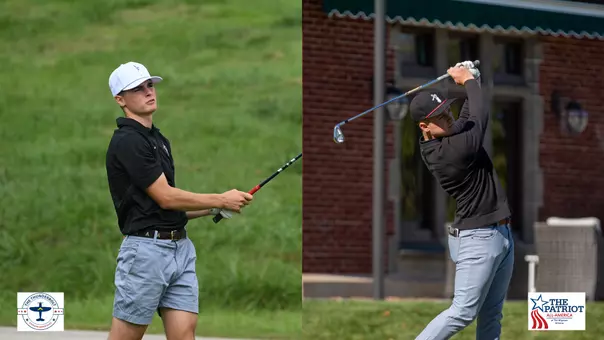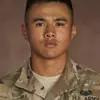Army West Point Athletics

Feature Friday: Transitioning into a Leader
March 09, 2017 | Men's Golf
Feature Friday highlights the tremendous personal stories our coaches and cadet-athletes have to share on a weekly basis. Each Friday, a new feature story will be prominently highlighted on GoArmyWestPoint.com. The features will include multimedia pieces, as well as written stories by media outlets and the Army West Point athletic communications staff.
When a young adult decides to continue their education at a place like West Point, they are choosing to become a leader.
From the moment Justin Pagila of the Army West Point golf team stepped onto campus for Reception Day as a plebe, he became committed to becoming a leader of character.
"As I started studying more about the United States military's role in the world, I realized that there is so much more to fighting wars," Pagila said.
His in-depth research inspired him to look deeper into something called cross-cultural competence. According to globalcognition.org, cross cultural competence refers to one's ability to understand people from different cultures and engage with them effectively.
This is highly important when becoming a leader in the military. Officers are constantly working with individuals from different backgrounds and cultures. In order to be a true leader, one needs to be able to work with all different types of personalities.
"I thought the only way to truly experience something like that was to do it first hand, rather than read about it," Pagila added. "So I made the decision to study at the Chilean Military Academy."
Being able to have this opportunity gave Pagila the ability to not only work in a distant land, but also the chance to learn from a foreign military. Throughout his experience with the Chilean Army, Pagila did a lot of field training in the mountains and desert.
"The biggest thing that I learned was the ability to work with people from a different culture" Pagila said. "When you are working with a culture that is so different than your own, you are going to find that there are frictions that may arise. Being a leader is learning how to handle those frictions and turn them into commonalities."

One of the special things that Pagila got to experience in Chile while studying for five months from July-November in 2015 was the Mountain Warfare School. In this subsection of the academy, the cadets went through a skiing and survival phase.
"During the skiing portion we learned different techniques of moving through the mountains on skis and snowshoes," Pagila said. "We also learned how to perform rescue missions in case of an avalanche. Then in the survival phase, we learned how to endure the extreme cold and snowy environments."
After spending some time in the mountains, Pagila got to experience training in the Chilean deserts as well. He was introduced to the tactical side of the army, including how to operate and move on the battlefield.
"I was fortunate enough that they gave me the opportunity to participate in a lot of their training sessions," Pagila added. "At one point they actually made me an instructor for patrolling techniques, which was really cool. They seemed to take a great interest in the way that the United States Army doctrines these tactics. It became a learning experience for both parties involved."
During his time in Chile, Pagila was also able to still be a part of the Army golf team. He was allowed to fly back to the Academy for the team's annual rivalry competition with Navy on Oct. 16. Pagila helped the Black Knights defeat the Mids 6.5-4.5 before heading back.
"Justin is a phenomenal leader and his leadership has been invaluable to the success of our team during his four years," Army head golf coach Brian Watts said. "Most recently, as a team captain for the fall season, Justin brilliantly guided our squad both on and off the course. With a clear vision of what lies just after graduation, Justin not only does a great job of guiding members of the team with their golf games, but he also takes a keen interest in the academic and physical well-being of the team members."
Watts continued to have high praise for Pagila.
"Through his designed workouts and lead-by-example mentality, Justin's efforts led to an Army Physical Fitness Training average of 291 for the team during the fall semester this year. Justin understands West Point and its leader development mission. He is always working to improve, and he selflessly wants to help his teammates do the same."

Overall, his Chilean experience guided him to become a better cadet. It helped him not only develop his cultural skills, but also forced him to implement what he has learned at the United States Military Academy.
One of the major differences that Pagila noticed during his time with the Chilean Army was how the chain of command worked.
"I really like how the United States military emphasizes mission command where decision-making authority is dispersed," Pagila said. "We try to put the decision making as close as we can to where the actual decision needs to be made. Whereas with the Chilean Army, they have a very traditional hierarchal structure, which was very evident in their discipline and their respect for authority. The United States Army has its authority more dispersed."
Understanding differences is very important when learning how to become a leader. Knowing the structure that one must perform under, but also understanding how other countries handle their own authoritative structure can come in handy. It is also good to learn that there are different ways to be a leader. One situation may call for one style of leadership, while another situation and environment can change ones leaderships style or approach.
Pagila noted two major takeaways after being with the Chilean Army that he brought back and implemented into his leadership style. First, he commented that there is no substitute for competence.
"It didn't matter if I was only somewhat fluent in Spanish, they could still tell whether or not I knew what I was talking about."
The second thing was getting rid of any preconceived notions of how other cultures operate.
"I don't think that you should necessarily let go of the values that your culture taught you, but in order to operate effectively with others, you have to acknowledge that they have the exact same bias that you do. It is up to you to transcend that bias. If you want to work with someone, you can't always assume that they are going to meet you half way. It is up to a leader to go the extra mile to make sure that you can work together for the greater good."
With his new leadership perspective, it led him to realize that his path has steered him more toward the Marines. Throughout his time at the academy, going into the Marine Corps was always in the back of his mind.
"The mission of both organizations is to fight on land," Pagila said. "With every single war that has been fought that was the deciding factor. I love both the Army and the Marine Corps, but I started gravitating more toward the Marines as I got older. The major difference between the two are that Marines have to be ready to be deployed at any given second. They are constantly deploying their forces across the globe regardless if it is war-time or peace-time.
"Ironically, I decided to pursue the Marine Corps for the same reasons that caused me to go to West Point. While West Point commissions officers into all branches of the Army, every cadet is expected to train in basic soldier tasks. I believe that this foundation of light infantry tactics provides a common language for the entire Army to speak. The Marine Corps takes this principle a step further with their motto 'every Marine a rifleman'."
The knowledge Pagila has learned at the United States Military Academy has made him a better cadet, no matter where he decides to go for his next step in his military career. He will take all of the leadership qualities that are instilled in the cadet-athletes at West Point and will be commissioned into the Marine Corps after graduation.
"West Point has taught me the skills I need to succeed. The transition from the academy to the Marine Corps will be difficult and uncomfortable, but it is up to my own discipline and initiative to do it successfully."
When a young adult decides to continue their education at a place like West Point, they are choosing to become a leader.
From the moment Justin Pagila of the Army West Point golf team stepped onto campus for Reception Day as a plebe, he became committed to becoming a leader of character.
"As I started studying more about the United States military's role in the world, I realized that there is so much more to fighting wars," Pagila said.
His in-depth research inspired him to look deeper into something called cross-cultural competence. According to globalcognition.org, cross cultural competence refers to one's ability to understand people from different cultures and engage with them effectively.
This is highly important when becoming a leader in the military. Officers are constantly working with individuals from different backgrounds and cultures. In order to be a true leader, one needs to be able to work with all different types of personalities.
"I thought the only way to truly experience something like that was to do it first hand, rather than read about it," Pagila added. "So I made the decision to study at the Chilean Military Academy."
Being able to have this opportunity gave Pagila the ability to not only work in a distant land, but also the chance to learn from a foreign military. Throughout his experience with the Chilean Army, Pagila did a lot of field training in the mountains and desert.
"The biggest thing that I learned was the ability to work with people from a different culture" Pagila said. "When you are working with a culture that is so different than your own, you are going to find that there are frictions that may arise. Being a leader is learning how to handle those frictions and turn them into commonalities."

One of the special things that Pagila got to experience in Chile while studying for five months from July-November in 2015 was the Mountain Warfare School. In this subsection of the academy, the cadets went through a skiing and survival phase.
"During the skiing portion we learned different techniques of moving through the mountains on skis and snowshoes," Pagila said. "We also learned how to perform rescue missions in case of an avalanche. Then in the survival phase, we learned how to endure the extreme cold and snowy environments."
After spending some time in the mountains, Pagila got to experience training in the Chilean deserts as well. He was introduced to the tactical side of the army, including how to operate and move on the battlefield.
"I was fortunate enough that they gave me the opportunity to participate in a lot of their training sessions," Pagila added. "At one point they actually made me an instructor for patrolling techniques, which was really cool. They seemed to take a great interest in the way that the United States Army doctrines these tactics. It became a learning experience for both parties involved."
During his time in Chile, Pagila was also able to still be a part of the Army golf team. He was allowed to fly back to the Academy for the team's annual rivalry competition with Navy on Oct. 16. Pagila helped the Black Knights defeat the Mids 6.5-4.5 before heading back.
"Justin is a phenomenal leader and his leadership has been invaluable to the success of our team during his four years," Army head golf coach Brian Watts said. "Most recently, as a team captain for the fall season, Justin brilliantly guided our squad both on and off the course. With a clear vision of what lies just after graduation, Justin not only does a great job of guiding members of the team with their golf games, but he also takes a keen interest in the academic and physical well-being of the team members."
Watts continued to have high praise for Pagila.
"Through his designed workouts and lead-by-example mentality, Justin's efforts led to an Army Physical Fitness Training average of 291 for the team during the fall semester this year. Justin understands West Point and its leader development mission. He is always working to improve, and he selflessly wants to help his teammates do the same."

Overall, his Chilean experience guided him to become a better cadet. It helped him not only develop his cultural skills, but also forced him to implement what he has learned at the United States Military Academy.
One of the major differences that Pagila noticed during his time with the Chilean Army was how the chain of command worked.
"I really like how the United States military emphasizes mission command where decision-making authority is dispersed," Pagila said. "We try to put the decision making as close as we can to where the actual decision needs to be made. Whereas with the Chilean Army, they have a very traditional hierarchal structure, which was very evident in their discipline and their respect for authority. The United States Army has its authority more dispersed."
Understanding differences is very important when learning how to become a leader. Knowing the structure that one must perform under, but also understanding how other countries handle their own authoritative structure can come in handy. It is also good to learn that there are different ways to be a leader. One situation may call for one style of leadership, while another situation and environment can change ones leaderships style or approach.
Pagila noted two major takeaways after being with the Chilean Army that he brought back and implemented into his leadership style. First, he commented that there is no substitute for competence.
"It didn't matter if I was only somewhat fluent in Spanish, they could still tell whether or not I knew what I was talking about."
The second thing was getting rid of any preconceived notions of how other cultures operate.
"I don't think that you should necessarily let go of the values that your culture taught you, but in order to operate effectively with others, you have to acknowledge that they have the exact same bias that you do. It is up to you to transcend that bias. If you want to work with someone, you can't always assume that they are going to meet you half way. It is up to a leader to go the extra mile to make sure that you can work together for the greater good."
With his new leadership perspective, it led him to realize that his path has steered him more toward the Marines. Throughout his time at the academy, going into the Marine Corps was always in the back of his mind.
"The mission of both organizations is to fight on land," Pagila said. "With every single war that has been fought that was the deciding factor. I love both the Army and the Marine Corps, but I started gravitating more toward the Marines as I got older. The major difference between the two are that Marines have to be ready to be deployed at any given second. They are constantly deploying their forces across the globe regardless if it is war-time or peace-time.
"Ironically, I decided to pursue the Marine Corps for the same reasons that caused me to go to West Point. While West Point commissions officers into all branches of the Army, every cadet is expected to train in basic soldier tasks. I believe that this foundation of light infantry tactics provides a common language for the entire Army to speak. The Marine Corps takes this principle a step further with their motto 'every Marine a rifleman'."
The knowledge Pagila has learned at the United States Military Academy has made him a better cadet, no matter where he decides to go for his next step in his military career. He will take all of the leadership qualities that are instilled in the cadet-athletes at West Point and will be commissioned into the Marine Corps after graduation.
"West Point has taught me the skills I need to succeed. The transition from the academy to the Marine Corps will be difficult and uncomfortable, but it is up to my own discipline and initiative to do it successfully."
Players Mentioned
2026 West Point Open (Army Spotlight)
Friday, January 16
Army Women's Basketball Ericson Feature
Friday, January 02
Wasabi Fenway Bowl Game Highlights
Saturday, December 27
This Week in Army Football: Wasabi Fenway Bowl - UConn
Saturday, December 27





